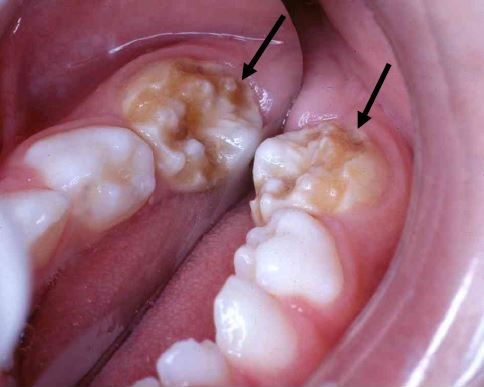Packaged food has been around from quite sometime and it we can be sure that there are chemicals which are used to keep the food last longer. Recent studies by Dr. Katia Jedeon of French National Institute of Health and Medical Research (INSERM) and colleagues have found two chemicals used in food packaging which might interfere in growth of dental enamel. The chemicals – bisphenol A (BPA) and vinclozolin have been identified as Endocrine disruptors based on other studies.
Endocrine disruptors as the name suggest interfere in hormone secretions in mammals which increase the risk of birth defects and other conditions like cancer etc. With BPA and Vinclozolin being Endocrine disruptors are found to be directly affecting enamel formation leading to defects in permanent teeth in children.

Bisphenol A or BPA is a product used in manufacturing various plastics and resins for food and drink packaging. Vinclozolin is a fungicide which is commonly used in preserving food substances and also to protect vineyards, orchards and golf courses from fungal growth. These two substances are known to block hormones which play a major role in tooth enamel production leading to Hypomineralization and in particular it is known to be an Etiology for Molar Incisor HypoMineralization.
Dr. Katia Jedeon and his team initially exposed rats with BPA alone and later with BPA and Vinclozolin combination daily for 30 days with doses similar to what hums might be exposed to. The cells collected from the rats after the 30 days doses showed that the cells exposed to BPA and viclozolin altered the expression of two genes – KLK4 and SLC5A8 which are responsible in regulation of tooth enamel mineralization.
In Ameloblasts collected from the rats, there was presence of estrogen and testosterone (sex hormones) which increase the expression of genes (KLK4 and SLC5A8 ) that produce tooth enamel. So with these findings it is clear that BPA and Vinclozolin affect the development of tooth enamel in children and inturn lead to conditions like Molar Incisor Hypomineralization.
Dr, Katia Jedeon said, “Tooth enamel starts at the third trimester of pregnancy and ends at the age of 5, so minimizing exposure to endocrine disruptors at this stage in life as a precautionary measure would be one way of reducing the risk of enamel weakening.”
It is better to avoid packaged food for pregnant women and children in development stages and fresh foods are the best for good growth and to prevent dental problems which have become quite common in many children around the world. So with the next case which you see children with teeth showing signs of Hypomineralization it is important to inform the parents about the ill effects of packaged food for teeth.
Leave a Reply